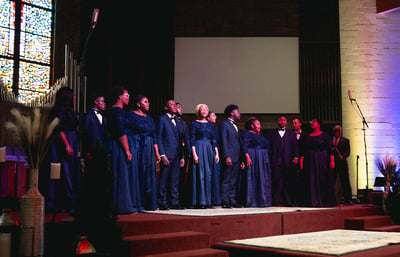Trevecca celebrates African American history through groundbreaking worship degree
| History

Trevecca’s African American worship studies masters program is the first of its kind in the nation. The curriculum is rooted in a rich tradition of African American sacred songs dating back centuries. Dr. Stephen Newby, the director of the Center for African American Worship Studies, sees the existence of this music as deeply theological.
“The sacred songs of this tradition have a particular theological grammar of liberation,” said Newby. “It comes from the gospels where Jesus says he is sent to preach to the poor and to heal the brokenhearted.”
Throughout history, the songs have gone beyond a scriptural foundation by addressing the experiences and hardships faced by those who sing them.
“The theology of African American sacred song in the Black church experience is that the worship has always reflected the tenor of the times,” said Newby. “James Abbingdon says ‘what Black people are singing religiously will provide a clue as to what is happening to them sociologically.’”
Originally, these two aspects of sacred song – the liberating proclamation of Christ and the reality of experience – were united in the lives of those who were enslaved and brought to America beginning with the transatlantic slave trade.
“In worship, it was a way of fighting against the physicality of enslavement. In the African American sacred song, the human body represents the rhythm, the soul, the melodic range, the spirit, the meter and time,” said Newby. “Their broken bodies arose and songs arose of long suffering and lament and liberation.”
Trevecca’s African American worship studies program seeks to fit squarely into this tradition, honoring the rich history of experience and oppression while acknowledging it does not have the final word in the life of the Christian.
“Singing the Black sacred song is missional, it's an act of piety, it transforms us into the people of God,” said Newby. “It reminds us that the tragedy of African enslavement and its systemic racist structures are null and void when it comes to the gospel.”
The program focuses on key elements including learning scripture; engaging with the writings of African-American theologians and authors; and the day-to-day practice of worship. The goal is to shape individuals who are prepared to create and lead thriving ministries and churches. For Babbie Mason, a student who will be in the program’s first graduating class, the curriculum has led to deepened faith.
“It is an adventure being in front of my computer on a daily basis with my nose in my Bible, writing, creating and digging deep into God’s word,” said Mason. “One of the most significant things is the application of the program. I began to understand God’s will for my life more and my seasons of worship have been sweeter and richer.”
The program is open to everyone seeking to deepen their faith, leadership abilities and knowledge of the rich legacy of African American worship in the church.
“Some people would say if you’re African American you need to participate in this because it will help you to learn more about leadership and your history. Others would say everyone needs to take it because often we only study European music without looking at classical American music,” said Newby. “I think that if you’re American or Christian or European, it would be advantageous. Whoever so will, let them come.”
Newby believes those who embrace the degree program will be changed at a level far beyond that of academic knowledge and that their lives and experience will embody the rich tradition of men and women who pursued worship and faith above all else.
“We’re getting people to connect the dots because if we can’t live holistically we’ll never be able to live out that gospel passage in Matthew 6, ‘let your light so shine before others so that they can see your good works and glorify your Father who is in heaven,’” said Newby. “At the end of the day, you’ll come out of this degree program wanting to glorify the Father.”
